Performance Supplements for Boxing
Every day on our @boxingscience_nutrition page we receive questions regarding supplements for boxing. The most recent questions are.
Will diet protein powders help me lose weight?
Which protein powder is the best?
Will caffeine improve my performance?
What is the best fat burning supplement?
Following on from part 1 supplements for boxing this 2nd article will introduce evidence-based supplements to improve boxing performance or aspects of boxing performance.
As we have previously stated we strongly advocate a food first approach. Therefore, this article is only directed to boxers who eat a varied diet and are over the age of 18.

The following supplements can help improve your boxing performance directly and indirectly. Directly can be defined as having an immediate impact following acute ingestion (caffeine, dietary nitrates) to improve your performance such as improve reaction time or delay fatigue. Indirectly can be defined as having a slower impact over a period of time, for example, helping to improve lean muscle mass or increase muscle carnosine stores (creatine monohydrate, beta-alanine, whey protein).
The following supplements have strong scientific evidence to support their use.
- Caffeine
- Creatine monohydrate
- Whey protein
- Beta-alanine
- Dietary nitrates
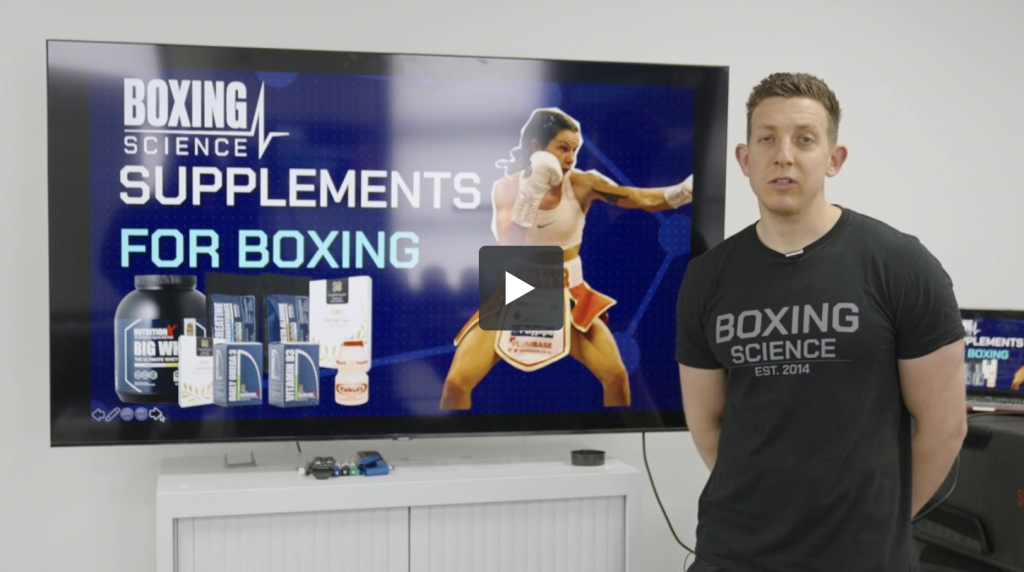
Caffeine
Caffeine is probably the number 1 performance supplement for all sports including boxing because it can enhance performance in multiple ways. Caffeine has been shown to reduce fatigue and improve pain perception by having a positive effect on the central nervous system (Ganio et al. 2009). It can also improve reaction time (Santos et al. 2014) as well as rescue training sessions which may be negatively impacted by poor sleep or low energy (Souissi et al. 2019). Caffeine can also have a beneficial effect on fat burning. Yes, you read that correctly! Caffeine can increase fat burning! So put the expensive green tea extract and raspberry ketones down. The number 1 supplement that helps you lose body fat along with a negative energy balance is caffeine.
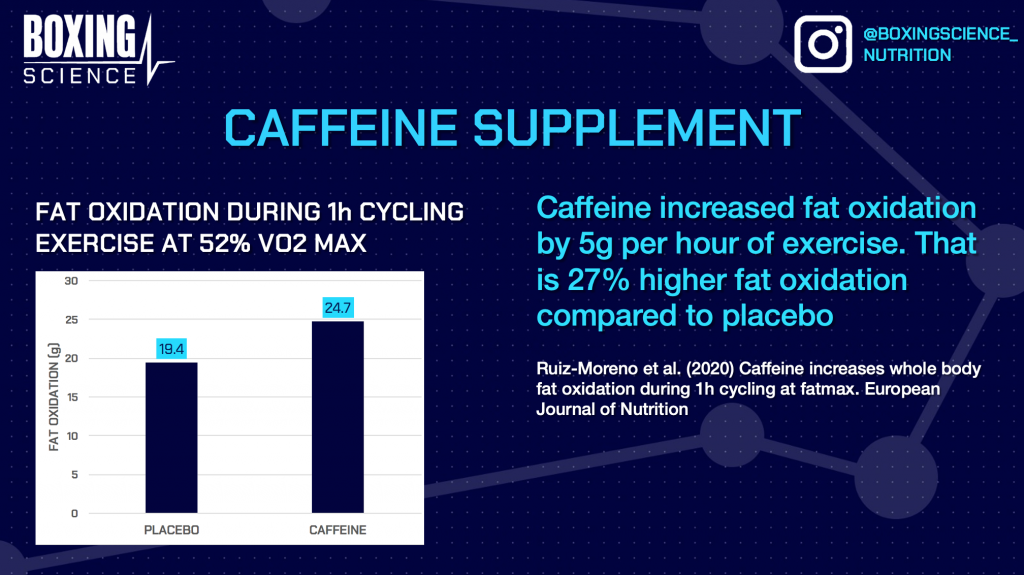
Ruis-Moreno and colleagues (2020) found that participants who ingested 3mg/kg of caffeine before a 1-hour cycling session at fat max (52% VO2max) increased fat oxidation by 27% compared to the placebo. Acute ingestion of caffeine gum can also improve high-intensity performance such as repeated sprints, Yo-Yo intermittent recovery test and countermovement jump height (Ranchordas et al. 2019). Due to boxing being a high-intensity intermittent sport that requires high levels of aerobic endurance as well as reaction time caffeine supplementation will aid boxing performance.
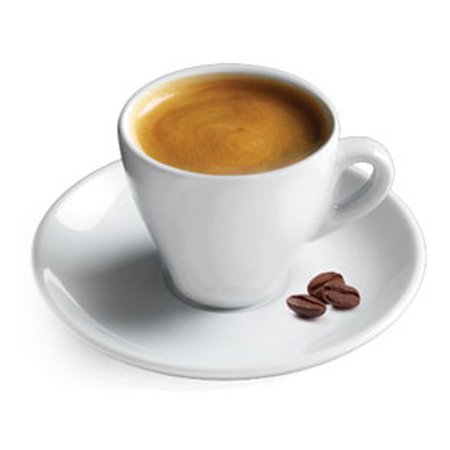
Caffeine can come in different forms including, tablets, coffee, gum and shots. Research shows that caffeine in the form of tablets, coffee and shots peaks at 45 minutes after ingestion with a half-life of 6 hours and can remain in the body for up to 9 hours. (Grgic et al. 2020). Caffeine gum has been shown to be absorbed quicker (5 minutes) with the same time of half-life and time to be eliminated from the body as tablets and drinks (Ranchordas et al. 2019).
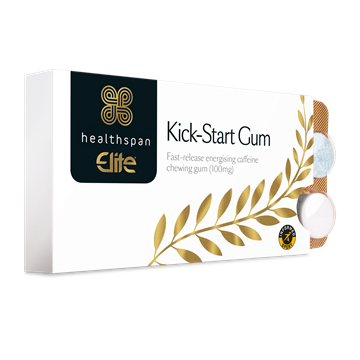
Most of the research shows that the ideal caffeine dosage for performance improvements should be 3-6mg\kg (Grgic et al. 2020). This would equate to 180mg of caffeine for a 60 kg individual. Please see table 1 below for estimated caffeine content per serving of popular caffeine products.
Side effects associated with caffeine use include insomnia and increased anxiety therefore we suggest avoiding the use of caffeine after 3 pm if possible.
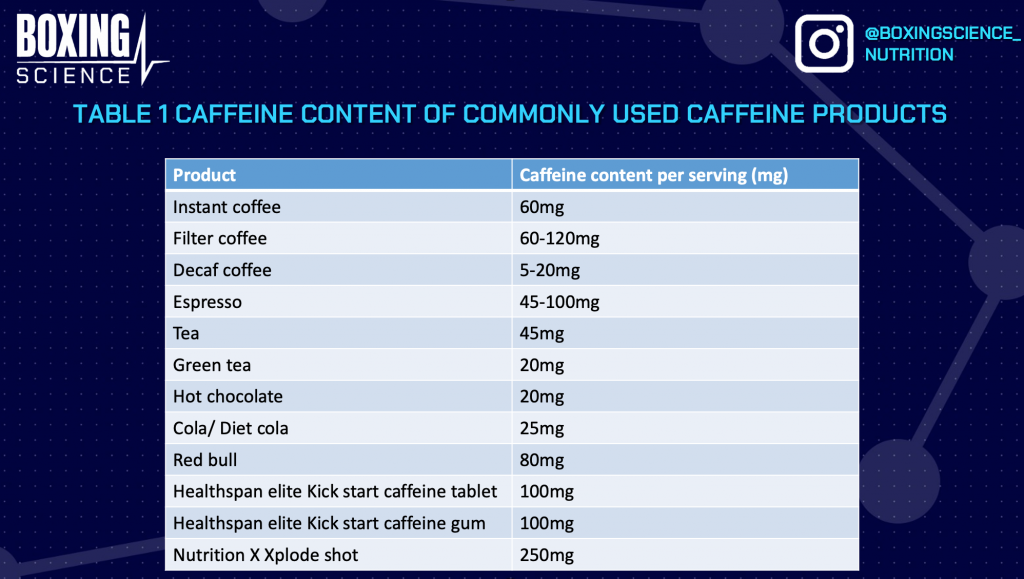
Caffeine recommendations
It seems apparent that appropriate ingestion of caffeine can improve aspects of boxing performance including, aerobic and anaerobic endurance as well as reaction time and muscle strength. We advise a dosage of 3mg/kg taken either 45 minutes or 5 minutes before boxing/exercise depending on the type of caffeine taken. We also advise avoiding the use of caffeine if you train in the late afternoon/evening as it can negatively affect sleep. Due to sleep being the number 1 performance and recovery enhancer it’s important to protect your ability to fall asleep and sleep deeply.
Creatine monohydrate
Creatine monohydrate is another well-researched supplement that has many benefits on performance as well as health. Creatine is an amino acid that plays a vital role as creatine phosphate in regenerating ATP in skeletal muscle from ADP, by transferring phosphates (Fieldman, 1999). Creatine has been shown to:
- Increase short duration high-intensity exercise (Flanagan 2007)
- Increase lean muscle mass (Syrotuik and Bell 2004)
- Increase muscular strength (Nissen and Sharp 2003)
Past studies have shown that a loading phase of 20 g taken in 5 g doses 4 times per day for 1 week followed by a maintenance dose of 5 g improved creatine absorption within skeletal muscle. However other studies have shown that creatine ingestion of 3 to 5 g per day is just as successful at saturating creatine within the muscle in the long term > 6 weeks (Hultman, 1996). Furthermore, creatine absorption has also been shown to increase when taken with protein only and a mixed macronutrient meal due to leucine and carbohydrate concentrations increasing the uptake of creatine to the muscle with the release of insulin (Syrotuik and Bell 2004).
Creatine supplementation has also been shown to increase brain phosphocreatine by 5-15% thereby, enhance brain bioenergetics. As well as performance, creatine supplementation has shown benefits on health including, diabetes, sarcopenia, cardiovascular and cognition (Kreider and Stout 2021).
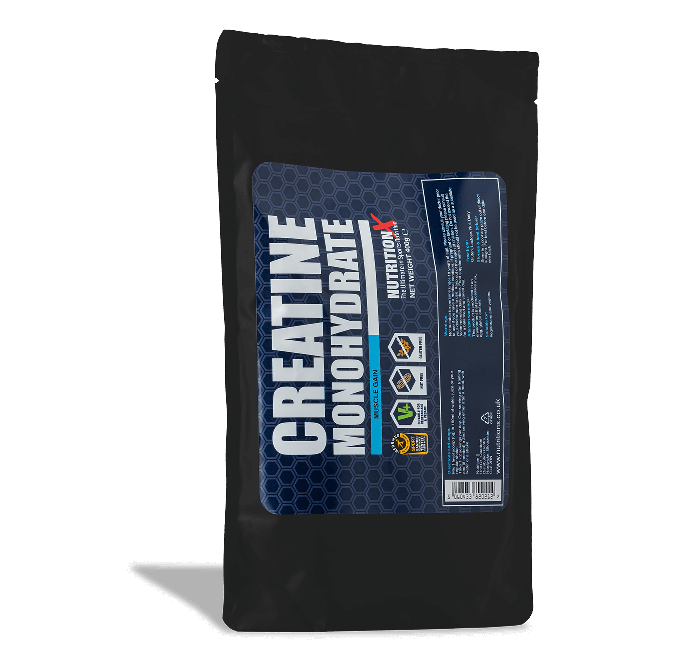
Vegetarian and vegan athletes may want to supplement with creatine monohydrate as past studies have highlighted that muscle creatine and phosphocreatine stores are 20-30% lower than non-vegetarians because the main source of creatine from food is meat and fish (Hultman,1996). The main side effect of creatine monohydrate is a quick gain in weight. Creatine monohydrate retains water especially in the intracellular compartments within the muscle cell (Bemben and Lamont, 2005). Supplementation of 5 g per day can increase weight by 1-2% depending on an individual’s muscle mass and current phosphocreatine stores.
Creatine recommendations
It has been long known that creatine monohydrate has beneficial effects on indices of performance and only recently has it come to light that creatine supplementation has a variety of health benefits. Due to the large amount of evidence supporting the use of creatine monohydrate we advise a dosage of 5 g per day during a training camp longer than 6 weeks. Finally, many companies try to promote different types of creatine such as creatine pure. Please note that these are more expensive and have no evidence to be better than creatine monohydrate.
Whey protein
Whey protein has been shown to increase muscle protein synthesis when taken immediately after resistance exercise at a dose of 20 to 40 g due to stimulating cell signalling pathways and increasing net protein balance (McNaughton et al. 2016). Whey protein contains a high amount of leucine typically 2 to 3 g per serving which has been shown to increase muscle protein synthesis (Tang et al. 2009; Tipton et al 2007). Consequently, whey protein has been shown to aid the increase of lean muscle mass as well as reduce the effects of ageing diseases such as osteoporosis and sarcopenia (Volek et al. 2013). It has also been shown to reduce muscle soreness and promote recovery following eccentric exercise. (Buckley et al. 2010).
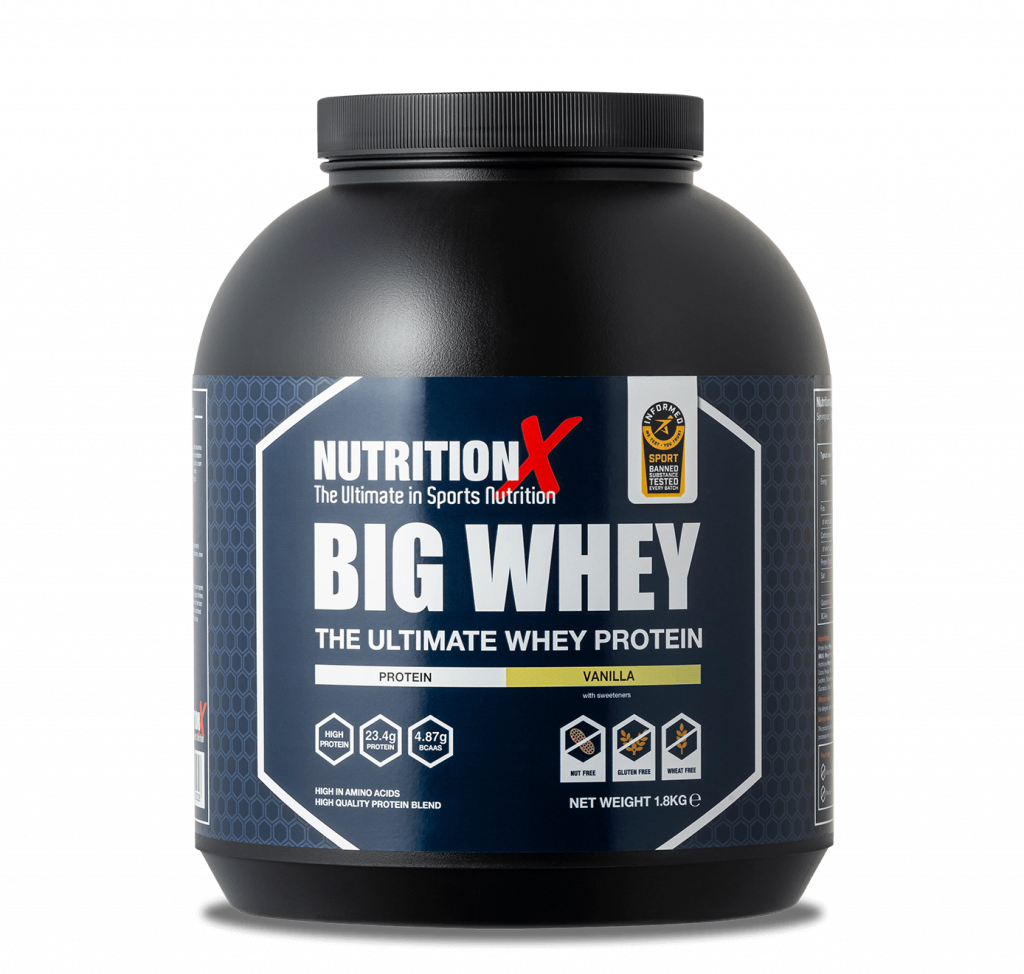
Total protein intake and distribution over the day is the most important aspect of protein consumption and recovery. As we always say at boxing science, we are a food first performance nutrition organisation, and we promote food over supplements in every aspect. However, whey protein can be a practical and efficient way of achieving daily protein targets. It can easily be added to foods and snacks as well as made into smoothies where other nutrient density fruits and vegetables can be added.
Protein consumption has been shown to increase satiety (feeling full) as well and increases the thermic effect of feeding compared to carbohydrates and fat (Halton et al. 2004). In particular, whey protein has a high satiating effect due to a possible secretion of incretin hormones in the gut (Bendtsen et al. 2013). This is one of the main reasons why we suggest a whey protein drink following a training session to help keep hunger at bay before a post-workout meal in the 1 to 3-hour period after training.
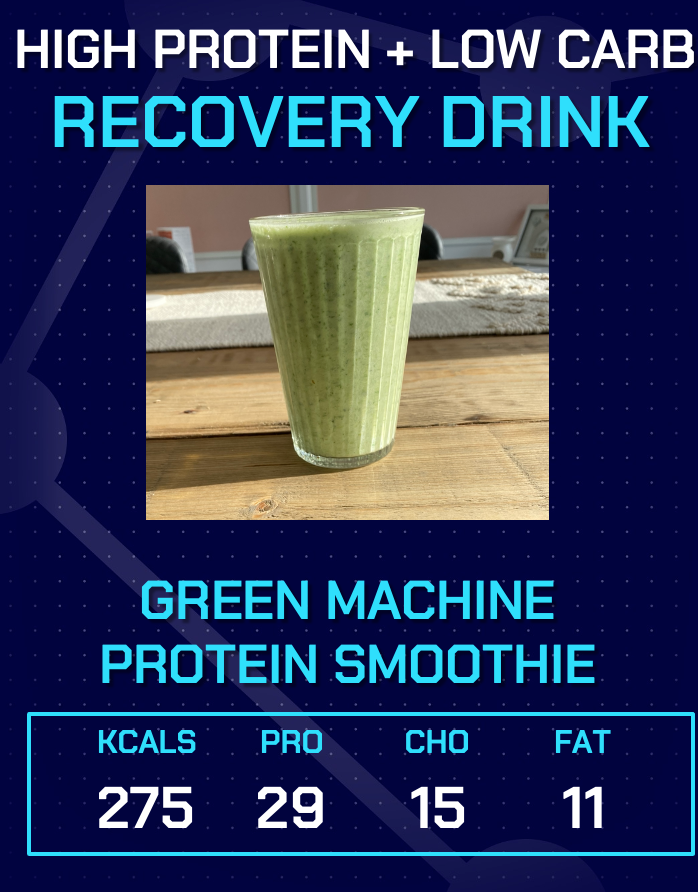
Similar to creatine monohydrate many companies try to sell more expensive protein powders such as diet protein powder, hydrolysed whey protein and grass-fed whey protein without any direct evidence showing that it is superior. For this reason, we suggest using an informed sport approved whey protein isolate or concentrate, as both products have similar beneficial effects on recovery and improvements in lean muscle mass.
Whey protein recommendations
Consume 20 to 40 g of whey protein isolate or concentrate after hard training sessions to improve recovery and help increase lean muscle mass and satiety.
Beta-alanine
Beta-alanine is a non-essential amino acid that is the rate-limiting precursor to the synthesis of carnosine within muscle. Carnosine is a cytoplasmic dipeptide that plays a role in intracellular buffering of hydrogen to reduce fatigue thus increasing high-intensity performance (Stout 2005). Other than, increasing muscle carnosine content beta-alanine has also shown to act as an antioxidant and anti-glycation and improves calcium sensitivity in muscle fibres thereby augmenting force production (Sale et al. 2010).
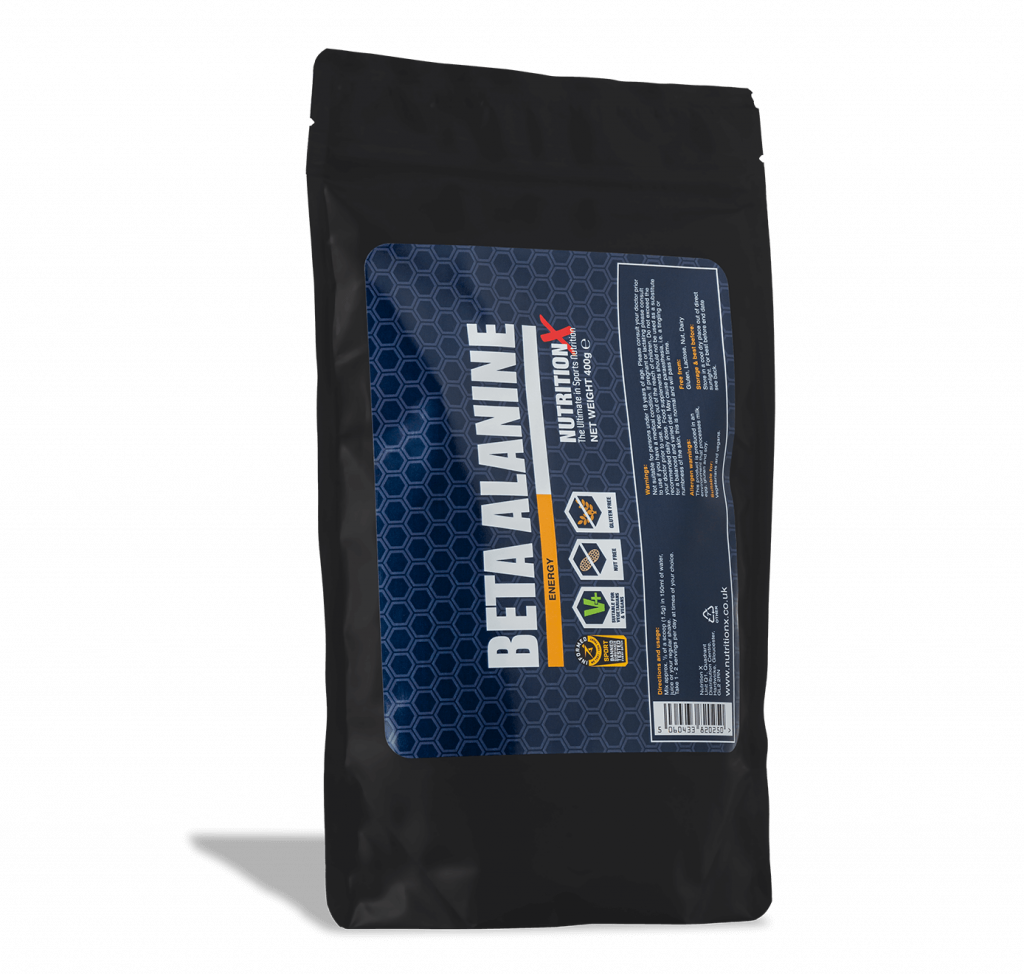
Donavan et al. (2012) investigated the effects of (4 x 1.5 g) beta-alanine supplementation taken for 4 weeks on punch force and frequency in 16 amateur boxers. Beta-alanine supplementation increased post lactate accumulation (post supplementation 12.6mmol/L, pre supplementation 9.5 mmol/L) compared to the placebo group (post supplementation 7.0 mmol/L, pre supplementation 8.0 mmol/L). In addition, beta-alanine supplementation also increased punch force and the total number of punches thrown during 3 x 3-minute rounds with 10 seconds of all-out punching at the end of each round. This provides evidence that beta-alanine supplementation can improve boxing specific punch output.
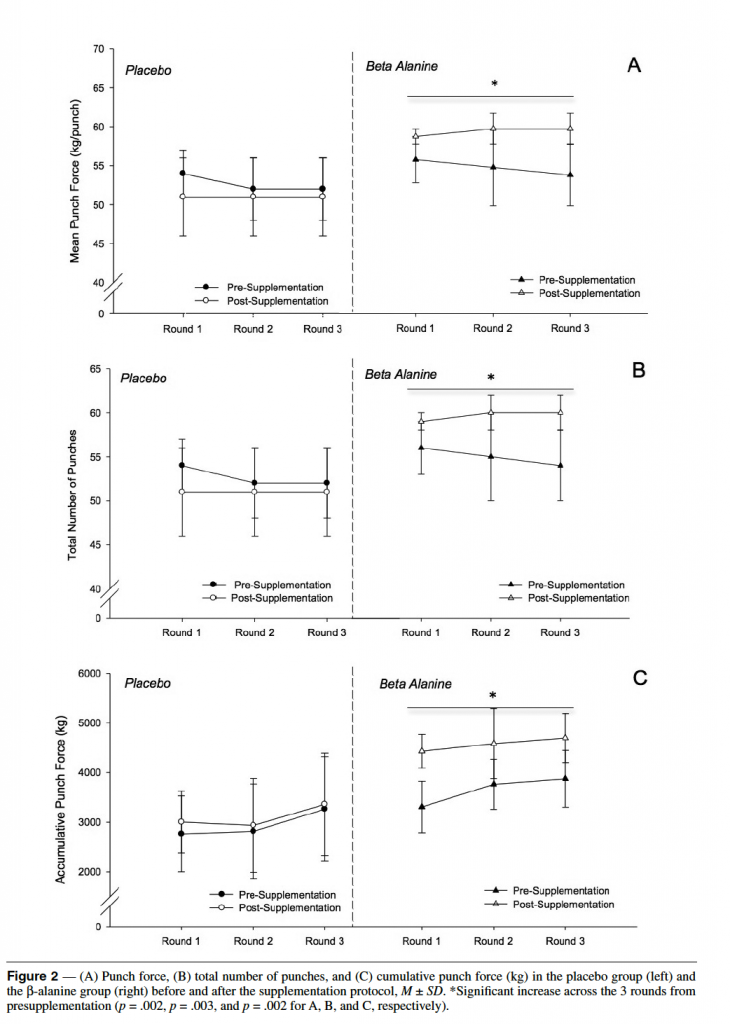
Saunders et al. (2012) reported that beta-alanine supplementation improved high-intensity repeated performance using a Yo-Yo intermittent test. Moreover, a meta-analysis by Hobson et al. (2012) found that beta-alanine supplementation increased exercise capacity compared to placebo and exercise performance during high intensity activities lasting longer than 60 s. The authors reported that the optimal dose was found to be 1.6 g ingested 4 times per day equating to 6.4 g per day taken over 6 weeks.
Despite, past studies showing beneficial effects for boxing performance, a side effect of beta-alanine is paresthesia which causes tingling sensations on the skin especially on the arms and face. Paresthesia can be reduced when ingested with meals due to increased absorption or when taken as capsules rather than powder (Sale et al. 2010; Saunders et al 2012). However, anecdotally paresthesia is worst during a period of low energy intake possibly due to lower carbohydrate intake. This can cause individuals to be less compliant in taking the correct dosage of beta-alanine that is needed for a beneficial effect.
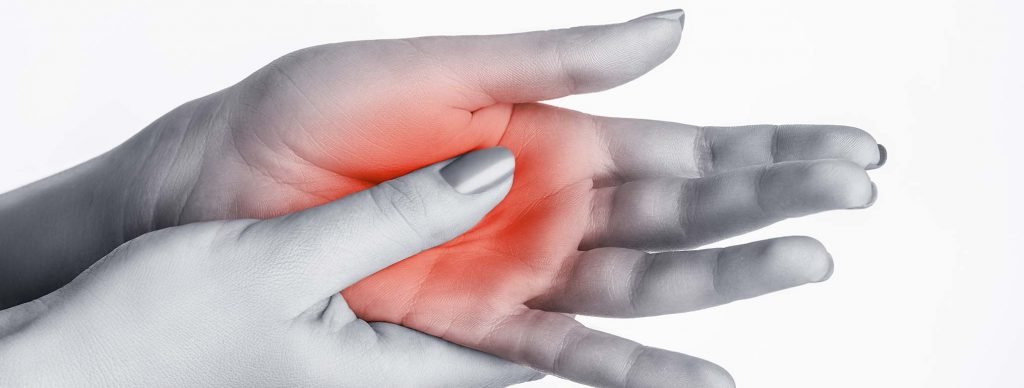
Beta-alanine recommendations
Beta-alanine requires a loading period in order to improve performance. Research suggests loading the supplement for a minimum of 4 to 6 weeks taking 4 doses of 1.5 to1.6 g per day consumed with food or a protein/ carbohydrate drink to minimise the side effects of paresthesia.
Dietary nitrates
Consumption of foods that are rich in nitrates such as beetroot and green leafy vegetables can offer physiological benefits such as improvements in cardiovascular function (Bondonno et al. 2016). As well as improvements in cardiovascular function, dietary nitrate consumption can also improve aerobic endurance (Jones et al. 2014), High-intensity intermittent running (Thompson et al. 2016), muscular strength (Whitfield et al. 2016) and muscular endurance performance (Alvares et al. 2021).
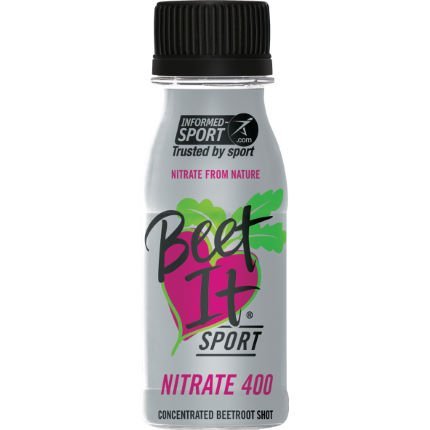
Despite, no studies investigating dietary nitrates on boxing performance, studies have found positive performance effects and physiological benefits in sports utilising the upper body. For example, De Oliveira and co (2018) found that a beetroot-based gel supplement consumed for 8 days in train jiu Jitsu athletes prevented a decline in handgrip maximum strength following 3 sets of handgrip exercise. The study also found that the beetroot gel increased forearm muscle oxygenation during the 3 sets of handgrip exercise compared to the placebo.
In addition, acute beetroot juice consumption 150 minutes pre-exercise improved exercise economy during a 4-minute laboratory-based kayak performance test in national male kayakers as well as improved 500m time trial performance by 1.7% in female international kayakers (Peeling et al. 2015).
Dietary nitrates improve physical performances by reducing oxygen cost of exercise. ATP turnover rates from phosphocreatine hydrolysis and oxidative phosphorylation are lower following dietary nitrate supplementation, resulting in a significant reduction in the estimated total ATP turnover rate during submaximal and high-intensity exercise (Jones et al. 2018).
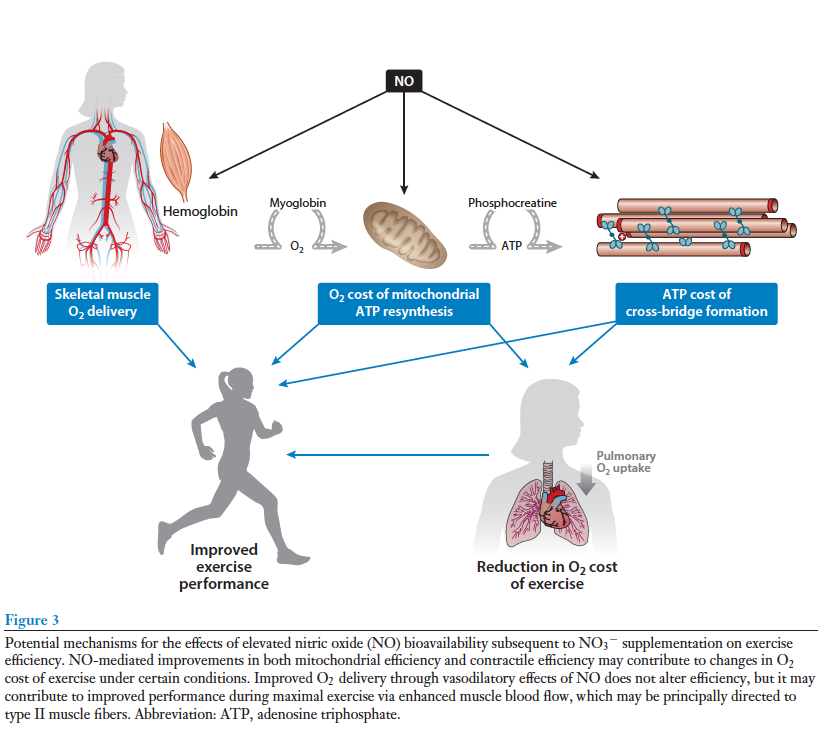
Past studies have used varying dosages for dietary nitrates improving performance. Wylie et al. (2013) found an optimal dosage of 8.4 mmol of NO3 (521mg) compared to 4.2 and 16.8 mmol of NO3 improving exercise economy during submaximal cycling exercise. 8.4 and 16.8 mmol of NO3 was similarly effective (+14% and +12%) at improving exercise tolerance. Hoon et al. (2014) also found beneficial effects of 8.4 mmol of NO3improving 2km rowing performance.
The majority of studies showing beneficial effects on performance through the ingestion of dietary nitrates have used untrained or recreational athletes. Therefore, the beneficial effects of dietary nitrates must be interpreted with caution. Elite athletes may require a higher dose of NO3 compared to less trained participants. Highly trained athletes are likely to have greater skeletal muscle capillarization and increased content of skeletal muscle calcium-handling proteins.
Nevertheless, some studies have demonstrated improvements from a lower dose of NO3 in well-trained athletes as mentioned above (Peeling et al. 2015). Furthermore, the upper body musculature may be more sensitive to nitric oxide supplementation. Given that the upper body musculature has been shown to contain a greater proportion of type 2 muscle fibres. Therefore, exercise modalities involving the upper body musculature such as boxing may be in favour of dietary nitrate supplementation compared to the lower body. (Jones et al. 2018).
Dietary nitrate recommendations
We advise a minimum dosage of 8.4 mmol of NO3 (521 mg) 150 minutes before boxing performance and boxers may even benefit from a longer dosing period of 3 to 8 days. If boxers are wanting to utilise dietary nitrates on fight night, we advise using them in the final sparring sessions to ensure there is no gut discomfort before a fight.
References:
ADCOCK, Kathryn H., et al. (2003). Neuroprotection of Creatine Supplementation in Neonatal Rats with Transient Cerebral Hypoxia-Ischemia. Developmental neuroscience; dev neurosci, 24 (5), 382-388.
ALLAH YAR, Razia, AKBAR, Atif and IQBAL, Furhan (2014). Creatine monohydrate supplementation for 10 weeks mediates neuroprotection and improves learning/memory following neonatal hypoxia ischemia encephalopathy in female albino mice. Brain research; brain res, 1595 , 92-100.
ALVARES, Thiago Silveira, et al. (2021). Effect of dietary nitrate ingestion on muscular performance: a systematic review and meta-analysis of randomized controlled trials. Critical reviews in food science and nutrition; crit rev food sci nutr, , 1-23.
ANTONIO, Jose (2004). Caffeine: The forgotten ergogenic aid. [online]. Strength and conditioning journal, 26 (6), 50-51.
BENDTSEN, Line Q., et al. (2013). Effect of dairy proteins on appetite, energy expenditure, body weight, and composition: a review of the evidence from controlled clinical trials. Advances in nutrition (bethesda, md.); adv nutr, 4 (4), 418-438.
BONDONNO, Catherine P., CROFT, Kevin D. and HODGSON, Jonathan M. (2016). Dietary Nitrate, Nitric Oxide, and Cardiovascular Health. Critical reviews in food science and nutrition; crit rev food sci nutr, 56 (12), 2036-2052.
BUCKLEY, Jonathan D., et al. (2010). Supplementation with a whey protein hydrolysate enhances recovery of muscle force-generating capacity following eccentric exercise. [online]. Journal of science and medicine in sport / sports medicine australia, 13 (1), 178-181.
DIETER, Brad P., SCHOENFELD, Brad Jon and ARAGON, Alan A. (2016). The data do not seem to support a benefit to BCAA supplementation during periods of caloric restriction. Journal of the international society of sports nutrition; J int soc sports nutr, 13 (21), 21-21.
DOLAN, Eimear, GUALANO, Bruno and RAWSON, Eric S. (2019). Beyond muscle: the effects of creatine supplementation on brain creatine, cognitive processing, and traumatic brain injury. European journal of sport science; eur J sport sci, 19 (1), 1-14.
DONOVAN, Tim, et al. (2012). β-alanine improves punch force and frequency in amateur boxers during a simulated contest. International journal of sport nutrition and exercise metabolism; int J sport nutr exerc metab, 22 (5), 331-337.
FELDMAN, E. B. (1999). Creatine: A dietary supplement and ergogenic aid. [online]. Nutrition reviews, 57 (2), 45-50.
FLANAGAN, Eamonn P. (2007). Creatine supplementation: Implications for the competitive weightlifter. [online]. Strength and conditioning journal, 29 (2), 60.
GANIO, Matthew S., et al. (2009). Effect of caffeine on sport-specific endurance performance: A systematic review. [online]. Journal of strength and conditioning research, 23 (1), 315-324.
GRGIC, Jozo, et al. (2020). Wake up and smell the coffee: caffeine supplementation and exercise performance-an umbrella review of 21 published meta-analyses. British journal of sports medicine; br J sports med, 54 (11), 681-688.
HALTON, Thomas L. and HU, Frank B. (2004). The Effects of High Protein Diets on Thermogenesis, Satiety and Weight Loss: A Critical Review. Journal of the american college of nutrition; J am coll nutr, 23 (5), 373-385.
HOBSON, R. M., et al. (2012). Effects of β-alanine supplementation on exercise performance: A meta-analysis. [online]. Amino acids, 43 (1), 25-37.
HODGSON, Adrian B., RANDELL, Rebecca K. and JEUKENDRUP, Asker E. (2013). The metabolic and performance effects of caffeine compared to coffee during endurance exercise
HOON, Matthew W., et al. (2014). The effect of variable doses of inorganic nitrate-rich beetroot juice on simulated 2,000-m rowing performance in trained athletes. International journal of sports physiology and performance; int J sports physiol perform, 9 (4), 615-620.
HULTMAN, et al. (1996). Muscle creatine loading in men. [online]. Journal of applied physiology, 81 (1), 232-237.
JAGIM, Andrew R., et al. (2012). A buffered form of creatine does not promote greater changes in muscle creatine content, body composition, or training adaptations than creatine monohydrate. Journal of the international society of sports nutrition; J int soc sports nutr, 9 (1), 43-43.
KREIDER, Richard B., et al. (2017). International Society of Sports Nutrition position stand: safety and efficacy of creatine supplementation in exercise, sport, and medicine. Journal of the international society of sports nutrition; J int soc sports nutr, 14 (1), 18-18.
MACNAUGHTON, Lindsay et al. (2016) The response of muscle protein synthesis following whole body resistance exercise is greater following 40g than 20g of ingested whey protein. Physiological reports, 4 (15), P1-13
NISSEN, Steven and SHARP, Rick (2003). Effect of dietary supplements on lean mass and strength gains with resistance exercise: A meta-analysis. [online]. Journal of applied physiology, 94 (2), 651-659.
PORCELLI, Simone, et al. (2016). Effects of a Short-Term High-Nitrate Diet on Exercise Performance. Nutrients; nutrients, 8 (9), 534.
RANCHORDAS, Mayur, et al. (2019). Effect of caffeinated gum on a battery of rugby-specific tests in trained university-standard male rugby union players.
ROSCHEL, Hamilton, et al. (2021). Creatine Supplementation and Brain Health. Nutrients; nutrients, 13 (2), 586.
RUIZ- MORENO et al. (2020) Caffeine increases whole-body fat oxidation during 1 h of cycling at Fatmax. (2020). European journal of nutrition.
SALE, Craig, et al. (2010). Effect of beta-alanine supplementation on muscle carnosine concentrations and exercise performance. Amino acids; amino acids, 39 (2), 321-333.
SANTOS, Victor G. F., et al. (2014). Caffeine reduces reaction time and improves performance in simulated-contest of taekwondo. Nutrients; nutrients, 6 (2), 637-649.
SAUNDERS, Bryan, et al. (2012). [Beta]-alanine supplementation improves YoYo intermittent recovery test performance. [online]. Journal of the international society of sports nutrition, 9 , 39.
STOUT, Jeffrey R. (2005). Beta-alanine: The new kid on the ergogenic block. [online]. Strength and conditioning journal, 27 (6), 90-91.
SYROTUIK, Daniel G. and BELL, Gordon J. (2004). Acute creatine monohydrate supplementation: A descriptive physiological profile of responders vs. nonresponders
TANG, Jason E., et al. (2009). Ingestion of whey hydrolysate, casein, or soy protein isolate: Effects on mixed muscle protein synthesis at rest and following resistance exercise in young men. [online]. Journal of applied physiology, 107 (3), 987-992
TARNOPOLSKY, Mark A. (2008). Effect of caffeine on the neuromuscular system–potential as an ergogenic aid. [online]. Applied physiology, nutrition, and metabolism 33 (6), 1284-1289.
TIPTON, Kevin D., et al. (2006; 2007). Stimulation of net muscle protein synthesis by whey protein ingestion before and after exercise. [online]. AJP – endocrinology and metabolism, 292 (1), E71-76.
THOMPSON, Christopher, et al. (2016). Dietary nitrate supplementation improves sprint and high-intensity intermittent running performance. Nitric oxide; nitric oxide, 61 , 55-61.
VOLEK, Jeff S., et al. (2013). Whey protein supplementation during resistance training augments lean body mass. [online]. Journal of the
WYLIE, Lee J., et al. (2013). Beetroot juice and exercise: pharmacodynamic and dose-response relationships. Journal of applied physiology; J appl physiol (1985), 115 (3), 325-336.
